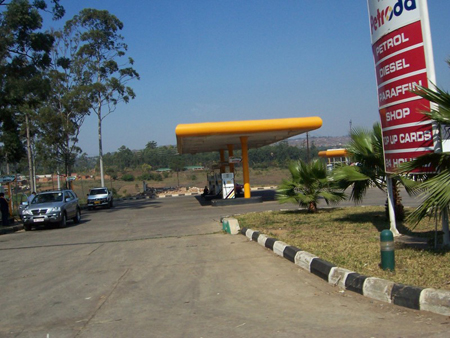There are growing calls in Malawi for the government to reduce the price of gas, following a worldwide trend which has seen gas prices plunge from a high of US$147 per barrel at their highest, to below US$40 in recent weeks. While motorists in many countries around the world have seen corresponding reductions in gas prices, in Malawi the price has stayed at the same amount it was when gas reached its highest prices per barrel in July 2008.

Petroda gas station in Malawi. Picture by Fukula Hastings Nyekanyeka
The first query on why gas prices in Malawi remained high even after the drastic reductions in other parts of the world appeared on a Malawian email listserv in November 2008. In a November 10th, 2008 response to that query, Chinthu Kalua stated that the issue had to do with the speed of transmission of prices from oil producers down to the Malawian consumer, a process he said dealt with market forces:
The speed of price transmition from the source to Malawi will determine the length of time it takes for the prices in Malawi to fall. Also the low prices you see being beamed on our TV screens are based on futures markets and thus the effect on our petrol stations will be felt much later.
Soon the question started appearing in the Malawian print and broadcast media, compelling the government to respond through the Malawi Minister of Finance, Goodall Gondwe. Gondwe was quoted in Nyasatimes, a Malawian online newspaper, as telling a Malawian radio station, Capital FM, that currently gas prices in Malawi were already lower than those in neighboring countries, and reducing the prices in Malawi would encourage smuggling, which would disadvantage Malawians. He also said there were indications that gas prices would soon rise again, and that Malawi therefore wanted to keep the prices stable.
More commentary appeared on the email listserv Nyasanet, with one Malawian issuing an ultimatum to government to reduce gas prices in accordance with global trends, or risk the wrath of voters in the forthcoming presidential and parliamentary elections on May 19th, 2009. That post attracted a lot of comments, with some commentators supporting the sentiment, and others opposing it.
In the last few days blogger Boniface Dulani has picked up the issue in an article on his blog, which has been republished in Nyasatimes. There the article has also attracted a significant number of comments. Dulani lays out his argument by providing the prices of gas in Malawi's neighbouring countries as well as in the United States.
The rationale behind the demand for fuel price reductions is simple and straightforward. In June this year, the price of a barrel of crude oil on the international market peaked at a whopping $147 a barrel (approximately 159 litres). Understandably, the pump price for petrol products across the world skyrocketed. In Malawi, the pump price for a litre of unleaded petrol shot up to the current K251.20. In neighbouring Zambia, the same was selling at ZK9,646 (equivalent to about MK 420) a litre. In the United States, the cost of a gallon (about 4 litres) shot up to a record $4.20.
Dulani goes on to provide the figures for the reduced prices of gas in Zambia, which at its peak was nearly double that of Malawi, and today the price in Zambia has come down to almost the price in Malawi, whereas in Malawi the price is still at its peak of MK251 per litre (approx. US$1.80). He also argues that the same trend has occurred in Mozambique and Tanzania, two other countries bordering Malawi. He ends the article by arguing that Malawi should abandon governmental control of gas prices and instead let prices fluctuate with market forces, which would also allow for differentiated gas prices in various parts of Malawi based on location, transportation costs and other factors. He also chides the Malawian public for not confronting the government on important issues, saying this would not happen in a country like Zambia, “where the people are more engaged and take particular interest in government decisions and demand credible explanations for decisions that affect their lives.”
So far in a space of hours, several comments have been posted in reaction to the article on Nyasatimes. Some agree with Dulani, while others disagree, pointing out that Malawi should act within its means and context, rather than copying from other countries for the sake of copying.







1 comment